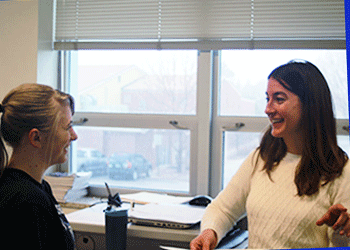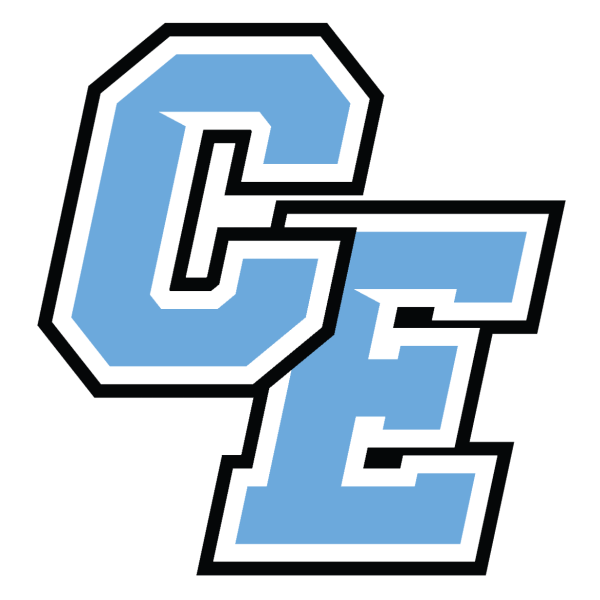From College to the Classroom: Student Teachers Take Over East High

History and Spanish student teacher Anne Hedderman assists a student in Kirk Nelson’s class. Hedderman student teaches for Nelson and Karen Pope.
April 13, 2015
The second semester calls for a student teacher invasion, and this year, the East High community has six student teachers scattered throughout the building. This is one of the final steps before they become working teachers, and they’re sharing their experiences with us.
Anne Hedderman- Social Studies and Spanish student teacher for Kirk Nelson and Karen Pope
Q: How do you juggle two subjects and manage working with two different teachers and classrooms?
A: It’s definitely been busy, and it’s a bit of a balance. It’s nice that I teach my Social Studies classes on A days and Spanish classes on B days. I like having it on and off because it keeps things separate, and it’s nice having that shift. It is definitely challenging but super fun, I couldn’t pick just one subject if I had to because I love both of them and am very passionate about them.
Q: How do you plan to use both subjects when you start teaching after college?
A: It will definitely depend on where I end up working. If they have a need for a teacher in both subjects, I would definitely do it. I can do either, but it all just depends on what the school will need. The other possibility in the future would be teaching a Social Studies course in Spanish (because) that would be fun.
Q:With that being said, have you thought about going to a Spanish speaking country to teach?
A: Possibly, the only trouble with that would be getting a certificate to teach in the specific country, because that’s usually something you would have to do, but I would be okay with doing that. If I do go back to a Spanish speaking country, I’ll probably teach English though because schools there usually have native Spanish speakers teaching courses like History and Social Studies.
Derek Peil- AP English student teacher for Cynthia Prevedel
Q: Tell me about your experience so far and how Mrs. Prevedel has helped you throughout your time here.
A: It’s been great, and I’ve enjoy being a part of the East High community and the opportunity to contribute to it. I enjoy working with the staff, students and administrators here. Mrs. Prevedel has been an excellent mentor, she’s very supportive and extremely savvy with her teaching, so she has helped me a lot.
Q: What’s the biggest challenge you have faced so far as a new teacher in the classroom?
A: My biggest challenge would probably be trying to practice and use all of the things I learned at the university and applying them to the classroom. I try to push myself to make the best lessons for the students as possible.
Rebecca Stewart- Math student teacher for Tolly McFarland
Q: What is your favorite part of teaching so far?
A: My favorite part of teaching so far is getting to work with the students one-on-one during class, and honestly getting ideas from the students. A lot of times, they solve things differently than I do, so it’s kinda cool to see how the students work through things compared to me.
Q: What is the biggest skill or lesson you’ll take away from this experience and bring into your own classroom?
A: There are so many things, but the biggest thing I will take will be the knowledge that every kid is different, every kid learns differently, and every kid wants different things. I really want to make it a goal in my future teaching to be able to connect with every student and get to every student in a different way.
Haley King- Math student teacher for Robert Salazar
Q: Tell me some things you have learned so far about teaching high school students.
A: While at UW, I just learned so much about the theory and everything, and so being able to come in and actually get to practice it, I’ve just learned so much. I’ve learned about classroom management and how students learn best. I’ve just loved taking what I’ve learned at UW and actually using it.
Q: Has student teaching been a huge challenge for you or has it gone better than it expected?
A: Its definitely gone better than I expected, but it is also challenging. It’s a lot of time, especially just being a new teacher. I don’t have any materials that I’ve used in the past, so it’s been great but definitely a challenge. Mr. Salazar has been great. We go over all the lessons before I teach, and he gives me feedback after I teach them so I can always improve.
Joshua Conine- Social Studies/History student teacher for Mark Seivley
Q: Why did you choose the high school level to teach?
A: I was a camp counselor at a summer science camp. There were junior high kids and high school kids (there), and I just had a blast. I think it is the “funnest” age level to teach.
Q: If you were a camp counselor at a science camp, what made you want to teach history and social studies instead?
A: History has always been a passion of mine, ever since I was a kid. Instead of reading Harry Potter, I was reading history books. I wanted to teach and I wanted to teach something I was passionate about.
Q: Was teaching something you always wanted to pursue as a career?
A: Not necessarily. I originally wanted to go into physical therapy and stuff like that. I tried it out and didn’t like it because it wasn’t enough one-on-one contact with people, so I decided to pick a different area.
Brittany Singhas- Math student teacher for Megan Moench
Q: What is the biggest challenge you have faced while student teaching?
A: Probably all of the paperwork we have to do (through UW). It’s a huge project that’s very similar to when teachers have to get nationally-certified for their boards. So we have to give students a pre-test and a post-test, and do a lot of analysis on both the pre-test and the post-test, as well as give very detailed lessons, record our teaching. It’s just a lot of work for something that may not determine if we graduate or not.
Q: What about in the classroom? What’s your biggest challenge?
A: I would have to say time management because, when you’re teaching, the time just flies. You have to really be cautious about what the time is and where you want to be by the end of the lesson. You just have to be very cautious because students are really good at getting you off-task and going on a tangent or you get into some good conversations about the content in the lesson.

